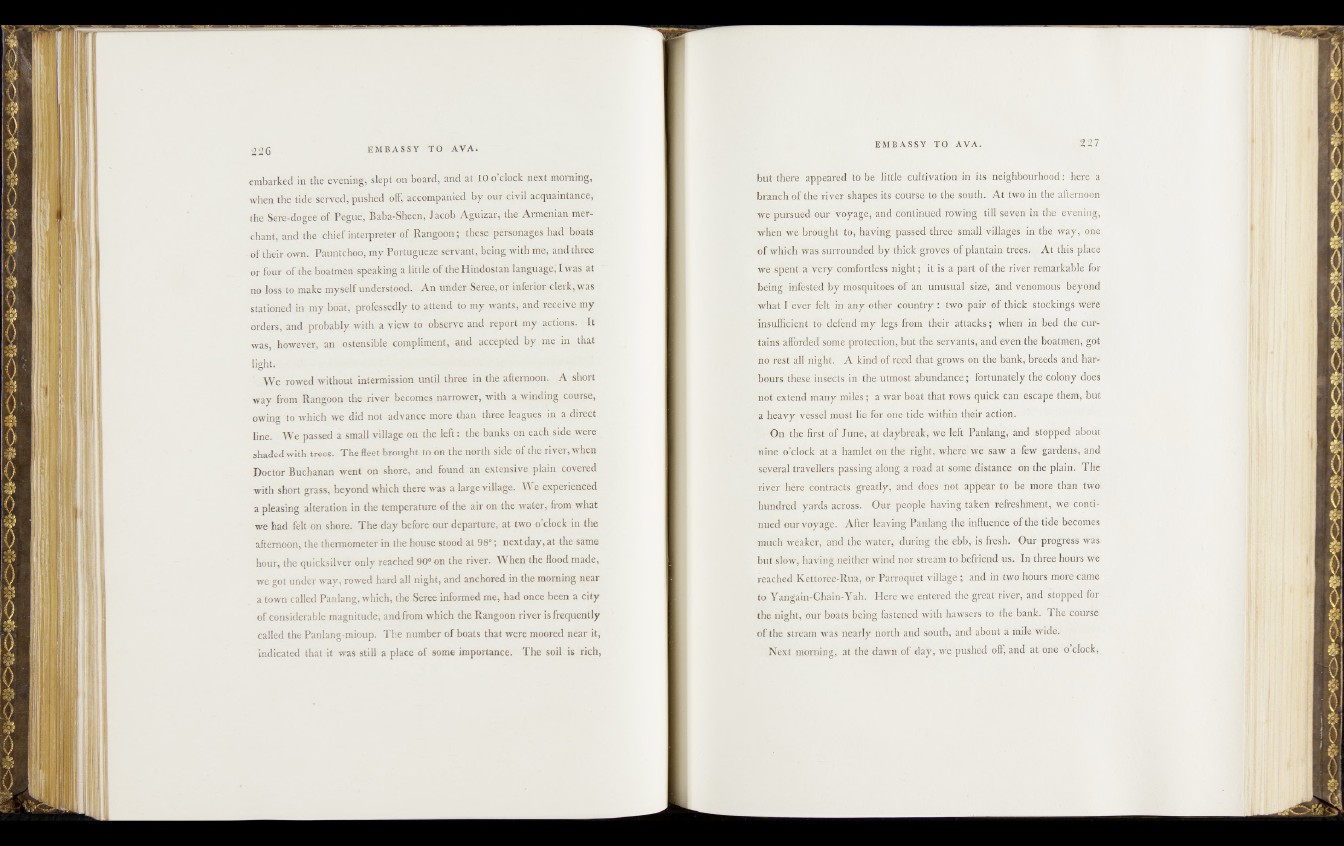
embarked in the-evening^ slept on beard, and at 10 o.’olock next morning,'
when-thC tide serv'ed^pfisfiSd'-ofh accompanied by our tiyifecqa^ntance',
the S e re '- flo g e e -^ ^ u e , Baba-Sheen, Jacob Aguizar, the Armenian merchant,
and the chief interpreter of Rangoon j^these personages hrdtfbogfcs-
-rtf their own. PauntchOo, my Portugueze servant, being'with me, andrthree
or four of the boatmen speaking a little of the Hindostandanguagc; I was at
no. loss to make myself understood. An under Seree, or inferior dgrk, was
stationed in my boat, professedly to.attend to my, wants, ap d^^give my
orders. and probably with a view to observe and..report-m.y .^ tio n ^ - i t
was, however, an ostensible compliment, and accepted by me in, that
light.
' We rowed without intermission until three in the afternoon. A,;shprt
way from Rangoon the river become&jiarrower, with a winding^cqu^e,
owing to which we did not advance more than three-Iqag^% in a direct
line. We passed a small village o n th e left % the banks-op eac|^de^were
shaded with trees. Thefleet brought toonthenorth^ijte.ofrthe r4v e r,y ^ en
Doctor Buchanan went on shore, and found an extensive plain: e.QVOred
with short grass, beyond which there was a large village, WeexperienC'ed
a pleasing alteration in the temperature of the air on the water, from what
we had felt on shore. The day before our departure, at two ocloekiin the
afternoon, the thermometer in the house stood at 98°; next day, at the same
hour, the quicksilver only reached 90" on the river. When the flood made,
we got underway, rowed hard all night, and anchored in the morning near
ft town- called Panlang, which, the Seree informed me, had once been a city
of considerable -magnitude, and from which the Rangoon river is frequently
called the Panlang-mioup. The number of boats that were moored near it,
indicated that it was still a place of some importance. The soil is rich,
but there appebti'M to^Bc-Uftitlt, culm tribiil rn UVneighbourhood! hcre^a
hi am h'ofetho •plvuSsIlipts’ its GKirie lo\tlJt!ls'^wih*\.t two in ilie-alumnon.
We‘$fi®isi£gd Our^fryagcSJ^iiil-Uom?ififtod row idg ^(Ps'dnciiiJiTi’t-lfc evening:
W-hfe'ri bhmlglat tdy8h“atiitg ^ ssto b ith u e' tmilUbAMI.^c'^irf the
fof „WlMh surfou nded iBy'MiiflS gi 61c s'< of p i mtaiti’6t&&s1§vAt'. thrh plaice
Wh;speSt" ait enj^emfri^ukss hight j id ist.i p irt othliLhw li’ remiMabledor
being liifcbtCd -hv mosqmtodSiWl. an .ti’ifisi^h'si/w’. 'afol ^rro?it(mOT|d@M
what I cun'lc 1l in anv ntlici country 1Wft*tpaii$Bfgilh i&Ltisto'cAilig i Avore
Sffis'ulliu'erri.-to cldciid'my^ Ii'gs'jfrwm their attacks; when hirbecftlio cirtf-
taius a Horded s’dlubpruU-CLion. hut the te n a n t,, rfrtdtcy L-ff.'tli'e’ fioaftntlTS got
ho resliSlWight. -A* knid^l.u* cl tint gro^s^^ilid'bnik,-hieecl'l,Jmcl liu -
hours lhesti"insects in the utmost ahnticfaftee; fortunately the cdiWy Vlo'es
hot ext|rfSsmany,'.miles1 y a War boat that MWs^quick cannc’scJiffe flnirtt hut
’a-heavyj vessel mush liw for one Itide, wifcbi>ft«lfiie'iT tfetlori«-
On the iifst of June, at daybreak, we left Panlang, and Slopped1 abdi'if
f%ine, o’ojdhfpat a hamlet oh thClT,i|ht,.iwiheref .we saw“, a dfeW i-'gafdeiiisif and
several travellers passing-df^i^-aiffbad.'at sorngj'distance '©n'the plaih*. The
H^er here?eoiatracf&ic|reatly, ahd.'doest'not'' appear f e 'befnSofe- tl@n -tVo
"hundred yaids across. Om people having taken refreshment,- vfri coWti*
nued'our voyage. After leaving Panlang tte-mflueb^ofttMtide feecdmds.
'much Weaker, aiid-the water, during the ®hh\tis, fresh. OurUpMgre^s-Was
but'slow, having neither w ind'nor stream 'td.hefyiend n s .' In thfeedtotH's-we
reached Kettofee-Rua, oR-Parjrdquet aiichrn, two hou#S'-flihy^eMe
to Yangain-Ghaip-Yah. Here’ we;dirte®qd. the^retctnMr,1 arid skppuWor-
the night, our boats being fastened with him sets to the' bank. 1 he*c&Ti¥sdf
of the stream'was nearly berth' and<, south, and? about a5triiIeWWaeJr*ti
Next morning, at the dawn of day, weptiShed.’-off,''afed a ^ flHty ddck,